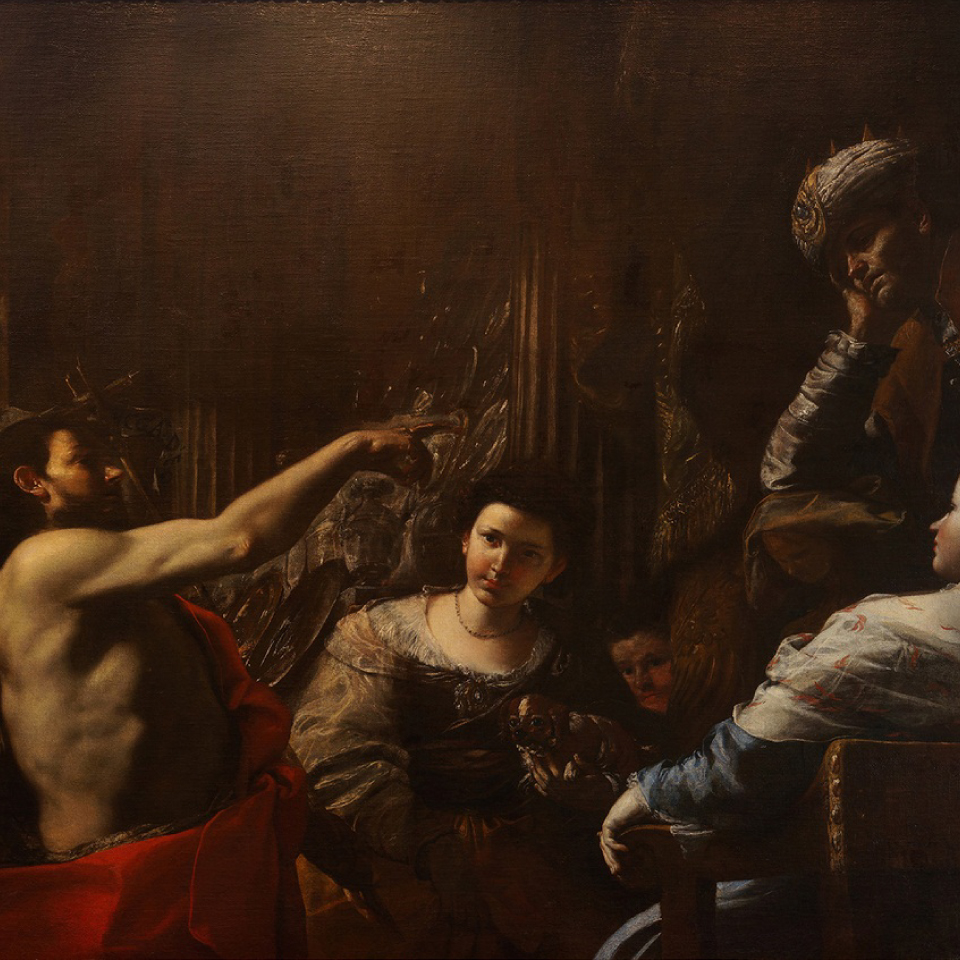Herod feared John, knowing him to be a righteous and holy man,
and kept him in custody.
When he heard him speak he was very much perplexed,
yet he liked to listen to him.
[At a party . . .]
Herodias’ own daughter came in
and performed a dance that delighted Herod and his guests.
The king said to the girl,
“Ask of me whatever you wish and I will grant it to you….even to half of my kingdom.”
She went out and said to her mother,
“What shall I ask for?”
She replied, “The head of John the Baptist.”
The girl hurried back to the king’s presence and made her request,
“I want you to give me at once
on a platter the head of John the Baptist.”
The king was deeply distressed,
but because of his oaths and the guests
he did not wish to break his word to her.
So he promptly dispatched an executioner with orders
to bring back his head.
He went off and beheaded him in the prison. (Mark 6:20, 22-27)
In today’s liturgy, we recall the Passion of Saint John the Baptist. Our Gospel reading presents the beheading of this priest and prophet—a cousin of Jesus of Nazareth—as reluctantly ordered by a king who had made a rash and public promise.
Having lost his head in the excitement of a beguiling performance lasting mere moments, King Herod believed he had no choice but to take John’s head—to send a life into eternity—in order to save face.
One lesson to be gleaned from this story is that excitement makes us reckless—that we’re better off promising less, rather than more, particularly when we have lost our head to something outside of ourselves, whether it be in happy enthrallment or in stepped-up rage, because the following through part can end up being costly in ways we may never have imagined.
In Herod’s case, his offer—which clearly he had considered only on material grounds—ended up costing him an acquaintance and teacher whose words had mystified him, even as they drew him in. His offer left him bereft of a conduit to God that might have led him toward redemption.
That lesson carries through in our prayer lives too, where we can sometimes find ourselves making offers to God that he’s going to take us up on—because that’s what God does—and later thinking, “Whatever made me say that? God knows I was speaking metaphorically, right?”
We’ve all had the experience of feeling so buoyed during prayer, so uplifted, that we dare to offer “everything” to the Lord—everything we are, everything and everyone we love, all of our gifts—and like Herod, we really mean it when we say it. But then a few hours later, when we come down from that high, we think, “Oh . . . perhaps I was a bit hasty, there—a bit more effusive than I meant to be! I didn’t really mean he could have the people I love! I couldn’t live if something happened to any of them! I didn’t mean he could have my job, or my gifts, or my, you know . . . whole self—mind, body, and soul! I need those things! I need the people I love. I need my job. I need my arms and legs and mind and stuff!”
Because that’s often how we roll. We may say, ”Anything you want, Lord, Thy will be done!” But then we consider the Garden of Gethsemane and throw in an addendum: “Please, don’t wreck my life!”
None of us are Christ, and very few of us are willing Abrahams, ready to surrender whatever possesses the deepest part of our lives hearts to God, without question. Even the best, most spiritually heroic of us are probably more like the cautious servant in the parable of the talents (Matthew 25)—the one entrusted with a single talent (a small part of the Master’s broad possessions), and buries it to keep it safe rather than risk losing it. The Master, who’d meant to see some returns on the talent no matter how small, was most displeased, so he took even that away from the servant.
The message there is that we’re supposed to move forward in life and do our part, without worrying about losses and gains, content to let God justly see to all of that, because he understands the values from an eternal perspective we lack.
Like the Master, God means for us to engage with our gifts without fear, going forward boldly with whatever we’ve been given—be that great wealth or little, a large family or only one beloved confidante—and make the most of all of it; to “live life to the full” (John 10:10); and to trust that no matter what happens (“Thy will be done!”), everything will serve to his purposes, which are always to the good.
It’s a hard thing to trust that well, that completely, particularly when we realize that the offerings we make to God may well redound to his desires, but not to our own. It makes “Thy will be done” feel like a most dangerous prayer, sometimes.
But then we remember Herod, who managed to wreck his life with just one impulsive promise—wholly unconnected to prayer—that became an offering to nothing but his own lusts and grandiose ego. And he didn’t even have the hope of heaven to get him through the consequences of his promise.
We have that hope, we have that promise, of heaven.
Perhaps all of this put together means we must work toward becoming detached of the things that really don’t matter—entertainments, enthrallments, rages and effusions, the opinions of others—so that when we feel emboldened to pray “Thy will be done,” we may do it fearlessly, putting our whole lives into play in the fields of the Lord, whatever that may bring, with something like joyful hope.
